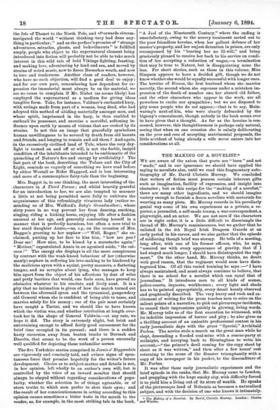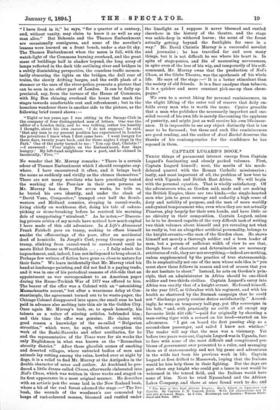THE MAKING OF A NOVELIST.*
WE are aware of the axiom that poets are " born " and not " made," and in our ignorance we should have applied the saying to novelists also, until we read this fragmentary auto- biography of Mr. David Christie Murray. We concluded that writers of fiction must possess certain inherent gifts such as imagination, facility of expression, and insight into character ; but in this recipe for the "making of a novelist," there are many other ingredients, and we should imagine variety enough to furnish a dozen novelists with materials for weaving as many plots. Mr. Murray records in his peculiarly genial way some of his own experiences as a private, a re- porter, a journalist, a self-made tramp, a war-correspondent, a playwright, and an actor. We are not sure if the characters are in right order, it is a little difficult to disentangle the thread of Mr. Murray's reminiscences, but we gather that he enlisted in the 4th Royal Irish Dragoon Guards at an early period in his career, and we also gather that the episode of soldiering though brief was stormy. He tells of a meeting, long after, with one of his former officers, who, he says, " assured me with every appearance of gravity, that if I had stayed much longer, I should have disintegrated the regi- ment." On the other hand, Mr. Murray thinks, no doubt with good reason, that the regiment would soon have disin- tegrated him. Of all this varied training he says :—" I have always maintained, and must always continue to believe, that there is no school for a novelist which can equal that of journalism." It introduces men to all kinds of scenes, police-courts, inquests, workhouses ; every light and shade has to be painted appropriately, every detail keenly observed and graphically described. The very hurry and rush and ex- citement of writing for the press teaches men to seize on the salient points of a narrative, to pick out picturesque incidents, to record their impressions quickly in glowing, living words. Mr. Murray tells us of the first execution he witnessed, with its indelible impression of horror and pity ; he also gives us a thrilling account of an amicable professional contest in his early journalistic days with the great " Special," Archibald Forbes. The novice stole a march on the great man while he slept, descending a flooded coal-mine with a rescue-party at midnight, and hurrying back to Birmingham to write his account,—" the printer's devil coming for the copy sheet by sheet as it was written," and then after a few hours' rest returning to the scene of the disaster triumphantly with a copy of his newspaper in his pocket, to the discomfiture of Mr. Forbes.
It was after these early journalistic experiences and the brief episode in the ranks, that Mr. Murray came to London, and grappling with the huge smoky city, with difficulty forced it to yield him a living out of its store of wealth. He speaks of the picturesque land of Bohemia as becomes a naturalised subject, and with the decision of one who knows it intimately.
• The Making of a Novelist. By David; Christie Murray. London : Chatto and Windus. "I have lived in it," he says, "for a quarter of a century, and, without vanity, may claim to know it as well as any man alive." But Bohemia and the Thames Embankment are occasionally contiguous, and some of the novelist's lessons were learned on a front bench, under a star-lit sky. The Thames Embankment when the moon is full, with the watch-light of the Commons burning overhead, and the great mass of buildings half in shadow beyond, the long array of lamps reflected in the dark tide outlining river and bridges in a subtly diminishing perspective, the ceaseless traffic momen- tarily obscuring the lights on the bridges, the dull roar of trains, the slowly drifting barges, and the swift plash of a steamer or the oars of the river-police, presents a picture that can be seen in no other part of London. It can be fully ap- preciated, say, from the terrace of the House of Commons, with Big Ben chiming overhead the hours that mark the stages towards comfortable rest and refreshment ; but to the homeless wanderer there is another side to the picture, as the following brief record shows :- " Eight or ten years ago I was sitting in the Savage Club in the company of four distinguished men of letters. One was the editor of a London daily, and he was talking, rather too humbly
I thought, about his own career. do not suppose,' he said, `that any man in my present position has experienced in London the privations I knew when I first came here. I went hungry for three days, twenty years back, and for three nights I slept in the Park.' One of the party turned to me : You cap that, Christie ? ' —I answered : 'Four nights on the Embankment, four days hungry.' My left-hand neighbour was a poet, and he chimed in laconically, Five."
No wonder that Mr. Murray remarks : " There is a certain odour of Thames Embankment which I should recognise any- where. I have encountered it often, and it brings back the scene as suddenly and vividly as the chimes themselves."
There are not many novelists who have practically tested the working of the Poor-law in their own persons as
Mr. Murray has done. For seven weeks, he tells us, he buried his own identity, and under the cloak of "David Vane, Compositor," tramped over half the South- western and Midland counties, sleeping in casual-wards, living chiefly on workhouse diet, doing his tale of oakum- picking or stone-breaking before he received his morning dole of unappetising " stirabout." As he notes,—" Discern- ing private critics of my novels have noticed how much capital I have made of this odd adventure. In A Life's Atonement Frank Fairholt goes on tramp, seeking to efface himself amidst the offscourings of the poor, after an accidental deed of homicide. In Joseph's Coat, young George goes on tramp, Blinking from casual-ward to casual-ward until he meets Ethel Doane at Wreathdale I fully admit the impeachment, and, indeed, I am not indisposed to brag about it. Perhaps few writers of fiction have gone as close to nature for their facts." We learn incidentally that Mr. Murray tried his hand at landscape-painting, and did not find it a paying trade, and it was in one of his periodical seasons of ebb-tide that an appointment as war correspondent to an American paper during the Russo-Turkish War of 1877 was offered to him. The bearer of the offer was a Colonel with an " astonishing Massachusetts accent," but after a wearisome delay at Con- stantinople, the agreement turned out to be waste-paper, the Chicago Colonel disappeared into space, the small sum he had paid in advance also melting into thin air in the Golden City. Once again Mr. Murray's luck, or, to speak• honestly, his talents as a writer of stirring articles, befriended him ; and this time the offer was genuine. He claims with good reason a knowledge of the so-called " Bulgarian atrocities," which were, he says, without exception the work of the Bashi-Bazouks and other auxiliaries, for he and the representative of the Times were for six weeks the only Englishmen in what was known as the "Roumelian atrocity district." After these ghoulish scenes of smoking and deserted villages, where unburied bodies of men and animals lay rotting among the ruins, howled over at night by
dogs, it is a relief to find Mr. Murray at the Antipodes in the double character of actor and author. At Auckland he pro- duced a little drama called Chums, afterwards elaborated into Ned's Chum, which was written in three weeks and staged on its first appearance in a most original manner. He describes with an artistic pen thS scene laid in the New Zealand bush, where a bit of the real forest adorned the stage :—" The live bush, the wounds of the woodman's axe concealed by heaps of vari-coloured mosses, bloomed and rustled under
the limelight as I suppose it never bloomed and rustled elsewhere in the history of the theatre, and the stage was ankle-deep in withered leaves ; the scent of the forest actually getting beyond the footlights for once in a. way." Mr. David Christie Murray is a successful novelist and journalist ; he has travelled far and seen many things, bat it is not difficult to see where his heart is. In spite of stage-panics, and fits of nauseating nervousness, in spite even of the loss of his wig, and temporarily of his self- command, Mr. Murray owns that the production of Ned's Chum, at the Globe Theatre, was the apotheosis of his whole life. He says of the stage :—" It is a better stimulant than the society of old friends. It is a finer anodyne than tobacco. It is a quicker and more constant pick-me-up than cham- pagne."
We own to a secret liking for personal reminiscences, to the alight lifting of the outer veil of reserve that daily en- folds every man who is worth the name. Cynics grumble that a man who publishes the necessarily imperfect and one- sided record of his own life is merely discounting the applause of posterity, and might just as well receive his own life-insur- ance. It is impossible to see any object distinctly that is too near to be focussed ; but these and such like reminiscences are good reading, and the author of Aunt Rachel deserves the thanks of his contemporaries for the confidence he has reposed in them.











































 Previous page
Previous page